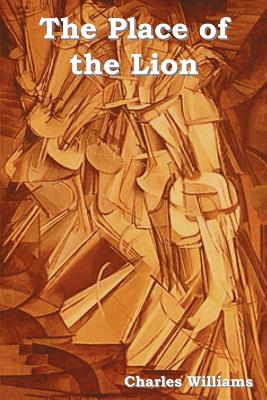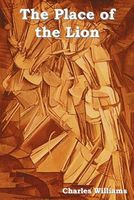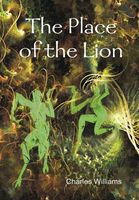- Welcome to FictionDB, Guest
- | My Account
- | Help

The Place of the Lion — Charles Williams

One man must save the human race from total destruction when a small British village is invaded by a terrifying host of archetypal creatures released from the spiritual world
In the small English town of Smetham on the outskirts of London, a wall separating two worlds has broken down. The meddling and meditations of a local mage, Mr. Berringer, has caused a rift in the barrier between the corporeal and the spiritual, and now all hell has broken loose. Strange creatures are descending on Smethem -- terrifying supernatural archetypes wreaking wholesale havoc, destruction, and death. Some residents, like the evil, power-hungry Mr. Foster, welcome the horrific onslaught. Others, like the cool and intellectual Damaris, refuse to accept what her eyes and heart tell her until it is far too late. Only a student named Anthony, emboldened by his unwavering love for Damaris, has the courage to face the horror head on. But if he alone cannot somehow restore balance to the worlds, all of humankind will surely perish in the impending apocalypse.
An extraordinary metaphysical fantasy firmly based in Platonic ideals, The Place of the Lion is a masterful blending of action and thought by arguably the most provocative of the University of Oxford's renowned Inklings -- the society of writers in the 1930s that included such notables as C. S. Lewis, J. R. R. Tolkien, and Owen Barfield. With unparalleled imagination, literary skill, and intelligence, the remarkable Charles Williams has created a truly unique thriller, a tour de force of the fantastic that masterfully engages the mind, heart, and spirit.
“One of the most gifted and intellectual Christian writers England has produced in [the twentieth] century.” -- Time
“Reading Charles Williams is an unforgettable experience.” -- Saturday Review
Charles Williams (1886�"1945) was a British author and longtime editor at Oxford University Press. He was one of the three most prominent members of the literary group known as the Inklings -- the other two being C. S. Lewis and J. R. R. Tolkien. Williams wrote poetry, drama, biography, literary criticism, and more, but is best known for his novels, which explored the primal conflict between good and evil. T. S. Eliot, who wrote an introduction to Williams's All Hallows' Eve, praised the author's “profound insight into . . . the heights of Heaven and the depths of Hell, which provides both the immediate thrill, and the permanent message of his novels,” and Time magazine called him “one of the most gifted and influential Christian writers England has produced this century.”
In the small English town of Smetham on the outskirts of London, a wall separating two worlds has broken down. The meddling and meditations of a local mage, Mr. Berringer, has caused a rift in the barrier between the corporeal and the spiritual, and now all hell has broken loose. Strange creatures are descending on Smethem -- terrifying supernatural archetypes wreaking wholesale havoc, destruction, and death. Some residents, like the evil, power-hungry Mr. Foster, welcome the horrific onslaught. Others, like the cool and intellectual Damaris, refuse to accept what her eyes and heart tell her until it is far too late. Only a student named Anthony, emboldened by his unwavering love for Damaris, has the courage to face the horror head on. But if he alone cannot somehow restore balance to the worlds, all of humankind will surely perish in the impending apocalypse.
An extraordinary metaphysical fantasy firmly based in Platonic ideals, The Place of the Lion is a masterful blending of action and thought by arguably the most provocative of the University of Oxford's renowned Inklings -- the society of writers in the 1930s that included such notables as C. S. Lewis, J. R. R. Tolkien, and Owen Barfield. With unparalleled imagination, literary skill, and intelligence, the remarkable Charles Williams has created a truly unique thriller, a tour de force of the fantastic that masterfully engages the mind, heart, and spirit.
“One of the most gifted and intellectual Christian writers England has produced in [the twentieth] century.” -- Time
“Reading Charles Williams is an unforgettable experience.” -- Saturday Review
Charles Williams (1886�"1945) was a British author and longtime editor at Oxford University Press. He was one of the three most prominent members of the literary group known as the Inklings -- the other two being C. S. Lewis and J. R. R. Tolkien. Williams wrote poetry, drama, biography, literary criticism, and more, but is best known for his novels, which explored the primal conflict between good and evil. T. S. Eliot, who wrote an introduction to Williams's All Hallows' Eve, praised the author's “profound insight into . . . the heights of Heaven and the depths of Hell, which provides both the immediate thrill, and the permanent message of his novels,” and Time magazine called him “one of the most gifted and influential Christian writers England has produced this century.”
Genres
Click on any of the links above to see more books like this one.






